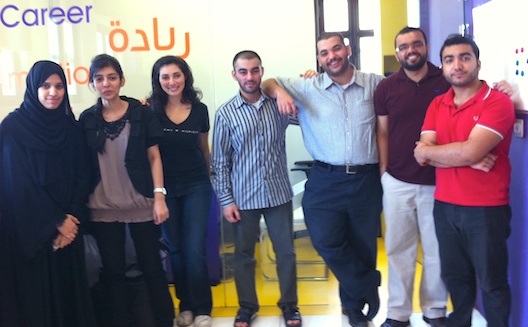Qatar's EduTechnoz makes learning Arabic fun for kids, with gamification


Two years ago, Diana Al-Dajani had a big problem. Her then
five-year-old son loathed doing his Arabic homework.
“It was an agonizing process. I was doing homework with him and he was screaming, ‘I hate Arabic, I hate homework, give me anything but Arabic!’” recounted Al-Dajani, a former IT solutions territory manager based in Doha, Qatar.“His homework was to blend two sounds together. I realized he didn’t even recognize the sounds or the letters for him to blend. I talked to the school about it later, and they said they don’t have time to make sure each child masters the skill before adding another one.”
So instead of forcing him to sit still and finish his worksheet, Al-Dajani decided to try a different approach. She wrote the letters and sounds on small square sheets of paper for her son to scramble and match together.
“Just after 20 minutes of playing this game, we had a line of the sounds beside each other, and we were trying to figure out what random drum sound did we make this time,” she explained. “And this is how he got it!”
The game was such a hit that the next day her son asked to play it again. But busy with work, Al-Dajani searched the web for a fun Arabic reading game for him to play instead. Disappointed with the lackluster children’s options she found online, she decided to put her computer engineering background to good use.
“I couldn’t find anything that matched the curriculum that he was studying at school -it’s all about relevancy. So I made that game for him,” she said. “He loved it! I was telling my friends the story and they loved it and said they wanted the game, too.”
That’s how her company, eduTechnoz.com, was born. With a mission “to inspire children to fall in love with Arabic by enabling kids to master every aspect of the language,” the bilingual site now offers more than 150 Arabic games for children aged three to seven. Users register for free and get access to five beginner games, and then have the option of choosing from among three different subscription plans that offer unlimited games monthly, biannually or yearly. Al-Dajani says the site already has around 20,000 registered users from around the globe.
“After conducting focus groups we found that everyone from
parents to teachers to students have the attitude that Arabic is
hard. And from the focus groups we learned that’s because the
schools are using outdated methodologies to teach and the creative
and innovative teachers can’t find proper resources to help them
convey the message,” Al-Dajani explained.
She says eduTechnoz tries to overcome this stigma by “gamifying”
the entire learning process for children. Not only do users learn
to read in Arabic through the site’s interactive computer games,
they also get to collect badges and awards when they complete each
game and skill level.
Stacking up against the competition
The closest competitor eduTechnoz has is perhaps
Jordanian company Little Thinking Minds,
which offers a few games as well as songs and video downloads for
children under seven. However, the online games provide only basic
preschool instruction and users are encouraged to purchase DVDs and
CDs for more comprehensive lessons.
eduTechnoz, on the other hand, is an entirely SaaS (software as a
service) enterprise, meaning all games are hosted through the site,
so no downloading or mail ordering is required. The games are also
a lot more sophisticated; featuring movable objects, bright colors
and lots of bells and whistles, they seem guaranteed to persuade
even the most skeptical of kids that learning to read in Arabic can
be easy and fun.
But the best part of Al-Dajani’s product is that the site’s games
are designed based on the standard Arabic-language curriculum used
in many schools in the Middle East and can be seamlessly integrated
into classroom instruction. Parents and teachers can also keep
track of children’s progress through real-time reports.
“We provide an
accumulative history of all the games a child plays,” Al-Dajani
explains. “We analyze it in such a way that a teacher or parent
would have a very powerful diagnosis tool to find individual
weaknesses in a child, which is very hard to do in a classroom.
The platform’s monitoring system can also email a parent or teacher
whenever a student’s performance dips below the expected average; a
report will recommend key lingual skills that need further
attention.

After being named best female entrepreneur at the 2013
MIT Enterprise Forum Arab Business Plan Competition this year and
winning second place in this year’s Al Fikra Business Plan
Competition, Al-Dajani is accelerating the startup’s growth,
teaming up with two nurseries and an international school in Doha
to incorporate eduTechnoz games into their instruction. A steady
stream of interns from Doha’s top universities are also now helping
her design games and make the site mobile and tablet
friendly.
But perhaps the biggest indicator of her success is the video
she showed me of school children playing her games via a big screen
in a classroom. Loud laughter and screams of excitement pierce the
air as the kids interact with the screen, a sight that affirms
Al-Dajani’s personal mission.
“I want to benefit everyone, so anyone who wants to learn Arabic
can. And I want my children to be exposed to these games in their
schools so they grow up loving the language and valuing the
culture,” Al-Dajani said. “It’s a part of your identity. If you
lose that, who are you?”


